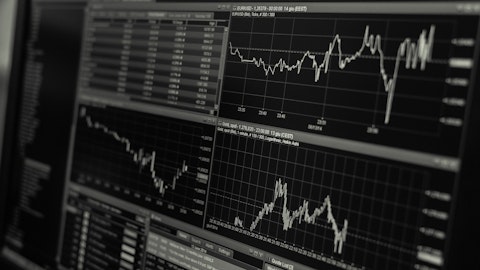In this article, we discuss the 5 best cash app stocks to invest in. If you want to read our detailed analysis of these stocks, go directly to the 10 Best Cash App Stocks to Invest In.
5. Uber Technologies, Inc. (NYSE: UBER)
Number of Hedge Fund Holders: 130
Uber Technologies, Inc. (NYSE: UBER) established its digital wallet service Uber Money in 2019, and the ride-hailing app is ranked sixth among the 10 best cash app stocks to invest in. Uber Money is a digital wallet that allows users to manage and move their money and see their earnings and spending history.
In the first quarter of 2021, Uber Technologies, Inc. (NYSE: UBER) reported an EPS of $0.45, beating estimates by $0.80. The ride-hailing company’s first-quarter revenue came in at $2.90 billion, down 11% year over year. The stock has gained 29% in the past twelve months.
On August 2, Gordon Haskett analyst Robert Mollins initiated a Buy rating on Uber Technologies, Inc. (NYSE: UBER) with a $65 price target, citing the company’s performance in the rides and deliveries area restaurant and grocery delivery services.
At the end of the first quarter of 2021, 130 hedge funds in the database of Insider Monkey held stakes worth $10.5 billion in Uber Technologies, Inc. (NYSE: UBER), down from 135 in the previous quarter worth $10.1 billion.
RiverPark Advisors, LLC mentioned Uber Technologies, Inc. (NYSE: UBER) in it’s Q4 2020 investor letter:
“UBER was also a strong contributor, as shares rallied following the approval of California’s Proposition 22 by voters, allowing the company’s California-based drivers to remain independent contractors (rather than become more expensive employees). We believe this news is not just about the 10%-15% of Uber’s revenue tied to California, but the influence this will have on other states reassessing driver pay. UBER also reported strong third quarter results with Delivery Gross Bookings growing 135% year-over-year which nearly fully offset a reduction in Mobility Gross Bookings, which were down 50% year over year. Total Gross Bookings for the quarter were down only 10% year over year as compared with down 35% last quarter.
Despite the COVID disruption, UBER remains the undisputed global leader in ride sharing (44% of the Company’s third quarter revenue), with greater than 50% share in every major region in which it operates. The company is also a leader in food delivery (46% of revenue), where it is number one or two in the more than 25 countries in which it operates. We view UBER as more than just ride sharing and food delivery, but also as a global mobility platform with the ability to sell to its more than 100 million users (by comparison, Amazon Prime has 130+ million members) and penetrate new markets of on-demand services, such as grocery delivery, truck brokerage and worker staffing for shift work. At its current $96 billion market capitalization, UBER trades at only 6x next year’s revenue from its two core businesses. Additionally, the company has substantial, seemingly unrecognized, value in its several nascent development businesses and another $12 billion in equity stakes in synergistic businesses around the world.”
4. Alibaba Group Holding Limited (NYSE: BABA)
Number of Hedge Fund Holders: 135
Alibaba Group Holding Limited (NYSE: BABA) is ranked fourth on the list of 10 best cash app stocks to invest in with its fintech arm Ant Group, formerly Ant Financial. Ant Group is one of the world’s largest fintech companies. It operates the AliPay electronic payment service for Alibaba Group Holding Limited’s (NYSE: BABA) e-commerce platforms Taobao Marketplace, Tmall, and AliExpress. In addition, Ant Group offers asset management and money-market investment services. Ant Group was targeting a $200 billion valuation in August 2020, which would have been the world’s largest IPO.
In the first quarter of the fiscal year 2022, Alibaba Group Holding Limited (NYSE: BABA) reported an EPS of $2.57, beating estimates by $0.35. The company’s first-quarter revenue grew 34% year over year to $31.8 billion. Ant Group accounted for nearly $696 million to Alibaba Group Holding Limited (NYSE: BABA).
On July 27, Mizuho analyst James Lee maintained a Buy rating on Alibaba Group Holding Limited (NYSE: BABA) with a $285 per share price target.
Out of the hedge funds being tracked by Insider Monkey, Washington-based investment firm Fisher Asset Management is a leading shareholder in Alibaba Group Holding Limited (NYSE: BABA) 14,129,399 worth more than $3.20 billion.
LongRiver Investments mentioned Alibaba Group Holding Limited (NYSE: BABA) in its Q2 2021 investor letter:
“There are a few new learning positions too, as I described I would make in my previous letter. I’ve written on my blog about Alibaba (here).
Alibaba’s mission is “to make it easy to do business anywhere” (“让天下没有难做的生意”). This subtle and elegant statement perfectly encapsulates Alibaba’s closed loop of services, which has the potential to assist merchants with every part of their business, from product design; to branding and marketing; to consumer acquisition and engagement; to logistics and fulfilment; to computing and IT; and even to consumer and business finance. Each of these services grew organically as Alibaba responded to merchants’ pain points, with the data shared between each arm of the business weaving one of the most comprehensive pictures of consumer behaviour ever seen. Merchants embracing Alibaba’s ecosystem must remake themselves around it to take full advantage of its potential. The reason to be bullish about Alibaba therefore isn’t just eCommerce; it’s the digitisation of China.
The reasons to be bearish, however, are that Alibaba faces an intensely competitive landscape and, now, regulators with a mandate to make it even more so. Times have changed, and it’s not clear to me what the future will look like, nor what it means for Alibaba’s future growth, profitability and competitive advantage.
Regulation:
The Chinese government has moved swiftly since it cancelled Alibaba’s sister-company Ant Group’s IPO last November to articulate and action a tighter regulatory stance towards Tech and Fintech. The former was codified by the State Administration for Market Regulation (SAMR) in a new and expansive set of anti-monopoly guidelines to specifically target internet platforms. The latter aims to reduce systemic risk to the financial system and is being managed by a quartet of financial regulators including the China Banking and Insurance Regulatory Commission (CBIRC) and the People’s Bank of China (PBOC).
We’ve had two major announcements in the last few days relating to Alibaba and Ant which give some clarity as to the scope and degree of intervention, but which also raise a lot of questions.
First, the SAMR issued an RMB18.2bn fine under its new guidelines to penalise Alibaba for forcing exclusivity on merchants. This practice (“二选一”) was brought into the spotlight in 2019 when Alibaba was sued by microwave maker Galanz for forcing it to choose between Alibaba and JD. The fine was less than the maximum allowable penalty (10% of revenues versus the 4% imposed) and less than the market’s expectations (as judged by the positive share price action which followed).
Alibaba’s CFO Maggie Wu also said on a call subsequent to the announcement of the fine that to make good, the company will also “reduce fees and charges to help merchants and brands; at the same time, also invest and spend more for them. So the impact [is] going to be both reflected in both top line and bottom line. So overall, we have reserved billions of RMB in additional annual spending to support initiatives in the future year”. If we read “billions of RMB” as in the range of RMB3-5bn, it would equate to just ~2-3% of the last twelve month’s adjusted core commerce EBITA.
Alibaba will take the fine and this lost income in its stride, and may have even planned to reduce certain fees anyway. But the ruling also means the end of a pressure tactic China Tech analyst Matthew Brennan (only somewhat facetiously) says “might be the key way Alibaba maintains its dominant position in eCommerce”.
Second, Ant has agreed with the financial regulators to restructure into a financial holding company, which will almost certainly require it to hold more equity against the loans it originates.
[Read the rest of the letter here]
3. PayPal Holdings, Inc. (NASDAQ: PYPL)
Number of Hedge Fund Holders: 143
Digital payment giant PayPal Holdings, Inc. (NASDAQ: PYPL) is ranked third on the list of 10 best cash app stocks to invest in. The California-based fintech company operates payment solution providers, namely PayPal, Xoom, Venmo, and Hyperwallet, to name a few.
In the second quarter of 2021, PayPal Holdings, Inc. (NASDAQ: PYPL) reported an EPS of $1.15, an increase of 8% year over year and beating estimates by $0.03. The company’s second-quarter revenue grew 17% year over year to $6.24 billion. PayPal Holdings, Inc.’s (NASDAQ: PYPL) total payment volume reached $311 billion in the second quarter, with over 400 million active accounts. The stock has gained 35% in the last twelve months.
On July 29, Jefferies analyst Trevor Williams maintained a Buy rating on PayPal Holdings, Inc. (NASDAQ: PYPL) with a $350 price target. Despite missing Wall Street consensus estimates on guidance, the analyst believes PayPal was driven down mostly by eBay Inc. (NASDAQ: EBAY).
At the end of the first quarter of 2021, 143 hedge funds in the database of Insider Monkey held stakes worth $14.7 billion in PayPal Holdings, Inc. (NASDAQ: PYPL), down from 147 in the preceding quarter worth $15.9 billion.
Lakehouse Capital mentioned PayPal Holdings, Inc. (NASDAQ: PYPL) in its Q2 2021 investor letter:
“PayPal had a tremendous year as it was a significant beneficiary in the pull-forward in ecommerce. Total payment volume increased by 50% year-on-year through the first quarter of 2021 thanks to significant growth in users and merchants. The company now has 392 million active users, up 20.6% from March 2020, who use PayPal an average of 42 times a year. The significant growth in users and activity both look structural to us, not cyclical, and we doubt the six-million-plus merchants who began accepting PayPal in the past year will suddenly stop accepting one of the internet’s most widely used forms of payment.
PayPal is a prime example of how a widely followed business can still be chronically misunderstood. FactSet tracks 48 analysts who publish price targets on the stock, suggesting PayPal’s shares should be efficiently priced, and yet PayPal has beaten analysts’ average sales and earnings estimates in 18 of the 21 quarters since it was spun off from eBay. We suspect the market tends to underestimate the business’ inherent operating leverage and that the lifetime values of incremental new users continue to rise over time thanks to improving functionality and a growing merchant base that allows new users to spend PayPal more widely than did their predecessors.
We continue to think that PayPal has a considerable growth runway not only from gaining share of a large, growing market via its core platform but also from new tools and functionality including an enhanced instore experience, crypto offerings, Pay with Venmo, and buy now, pay later. The business isn’t sitting still despite its strong position and we look forward to what the future holds.”
2. Alphabet Inc. (NASDAQ: GOOGL)
Number of Hedge Fund Holders: 185
Alphabet Inc. (NASDAQ: GOOGL), Google’s parent company, operates the e-wallet platform and online payment service Google Pay. The digital wallet service was first introduced in 2015 as Android Pay and then relaunched as Google Pay in 2018.
Alphabet Inc. (NASDAQ: GOOGL) posted an EPS of $27.26 in the second quarter of 2021, beating analyst expectations of $19.34. The California-based computer company reported a 62% increase in revenue year over year to $61.9 billion in its second-quarter report, beating analyst estimates of $56.16 billion.
Argus Research maintained a Buy rating on Alphabet Inc. (NASDAQ: GOOGL) on July 29 and increased the firm’s price target to $3,100 per share from $2,800, citing Alphabet Inc.’s outstanding second-quarter performance.
At the end of the first quarter of 2021, 185 hedge funds in the database of Insider Monkey held stakes worth $24.6 billion in Alphabet Inc. (NASDAQ: GOOGL), up from 179 in the preceding quarter worth $21.9 billion.
Baillie Gifford mentioned Alphabet Inc. (NASDAQ: GOOGL) in its Q2 2021 investor letter:
“Whilst several sources of upside remain, namely in the cloud business, hardware, and YouTube subscriptions, we have waning conviction in Alphabet‘s ‘moonshot’ bets (such as Waymo), substantial success in which would likely be required to produce a 5x return from here. Given the reduction in our assessment of the probability-adjusted upside, and with strong competition for capital in the portfolio, we therefore sold the Alphabet holding.”
1. Facebook, Inc. (NASDAQ: FB)
Number of Hedge Fund Holders: 257
Topping the list of the 10 best cash app stocks to invest in is Facebook, Inc. (NASDAQ: FB). The California-based tech conglomerate is well-known for its social media platforms. Yet, in 2019, Facebook, Inc. (NASDAQ: FB) launched Facebook Pay, a payment system that allows users to send payments directly by Facebook, Instagram, WhatsApp, and Messenger apps.
On July 14, Facebook, Inc. (NASDAQ: FB) announced that its Facebook Pay service would be offered outside of its social media platforms for the first time in August, debuting with Shopify retailers. Shares of Facebook, Inc. (NASDAQ: FB) jumped 7.24% in the last month.
Facebook, Inc. (NASDAQ: FB) announced an adjusted EPS of $3.61 in the second quarter of 2021, exceeding expectations of $3.03. The company’s second-quarter revenue was $29.08 billion, up 58% year over year and exceeding analysts’ expectations of $27.89 billion.
On July 29, Truist analyst Youssef Squali kept his Buy rating on Facebook, Inc. (NASDAQ: FB) and increased the firm’s price target to $425 per share from $400, highlighting the company’s AR/VR technology, video, and commerce as important contributing factors.
At the end of the first quarter of 2021, 257 hedge funds in the database of Insider Monkey held stakes worth $40.9 billion in Facebook, Inc. (NASDAQ: FB), up from 242 in the preceding quarter worth $38.2 billion.
Argosy Investors mentioned Facebook, Inc. (NASDAQ: FB) in its Q2 2021 investor letter:
“So how are our largest holdings affected in a world of higher wage inflation? As a general rule, I will evaluate current and potential future holdings on their capital intensivity and their ability to raise prices. Facebook is now (a part of) our top 5 largest equity holdings. I am probably least concerned about Facebook’s ability to thrive during an inflationary period. Because they are so efficient with capital, the market for IT programming labor is already fiercely competitive, and their advertising offering is considered to be very effective (and underpriced for its value), I think Facebook should weather any kind of inflation fairly well.”
You can also take a peek at Reddit’s WallStreetBets is Buying these 10 Stocks for Post-Earnings Gains and 10 Stocks to Buy According to Neil Shahrestani’s Ikarian Capital.





